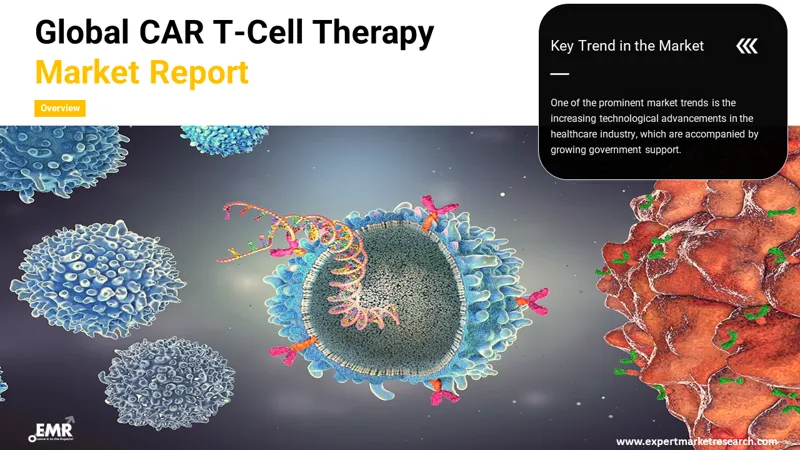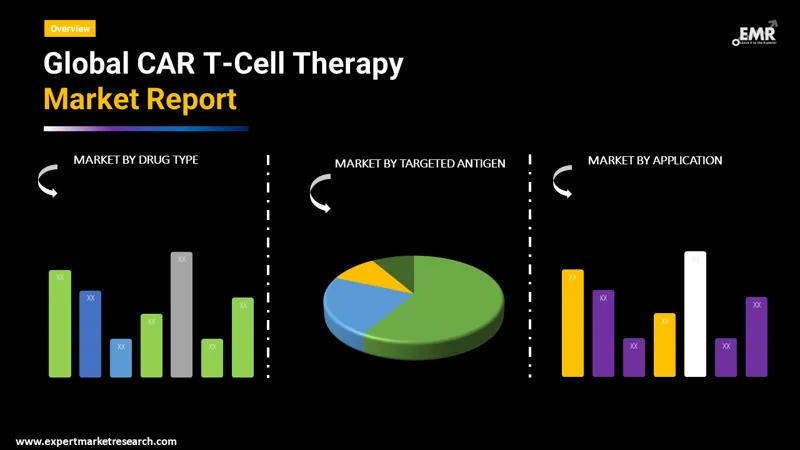
Consumer Insights
Uncover trends and behaviors shaping consumer choices today
Procurement Insights
Optimize your sourcing strategy with key market data
Industry Stats
Stay ahead with the latest trends and market analysis.
The global CAR T-cell therapy market was valued at USD 2.88 Billion in 2025. The industry is expected to grow at a CAGR of 15.20% during the forecast period of 2026-2035 to attain a valuation of USD 11.86 Billion by 2035.
Base Year
Historical Period
Forecast Period
Compound Annual Growth Rate
15.2%
Value in USD Billion
2026-2035
*this image is indicative*
Chimeric antigen receptor (CAR) T-cell therapy is a method of modifying the immune cells, also known as T-cells to fight and destroy cancerous cells in the body. The market demand is majorly driven by growing incidence of cancer. CAR T-cell therapy has also garnered substantial excitement amongst researchers owing to ability to eradicate advanced leukaemia and lymphomas. The market is further propelled by rising investments on CAR T-cell related research and development and subsequent growth in number of FDA approvals for new therapies.

Read more about this report - REQUEST FREE SAMPLE COPY IN PDF
Increasing Incidence of Cancer Cases
In 2023, cancer is expected to affect approximately 2 million people in the United States. Non-Hodgkin Lymphoma and Leukaemia are one of the top 12 cancers expected to affect around 80,550 and 59,610 patients respectively. Out of the two, leukaemia is anticipated to cause 23,710 deaths while Non-Hodgkin Lymphoma may lead to 20,180 deaths. Hence, the CAR T-cell therapy market demand is projected to surge in upcoming years, as researchers aim at maximising its application to offer improved patient solutions.
Rising Collaborations Between Key Players
In December 2023, AbelZeta and AstraZeneca entered a partnership to develop the autologous, armoured GPC3-targeting chimeric antigen receptor T Cells (CAR-T) therapy, C-CAR031, designed to treat hepatocellular carcinoma (HCC). C-CAR031 leverages AstraZeneca’s growth factor-beta receptor II (TGFβRII) dominant negative armouring discovery platform along with AbelZeta’s cell therapies. The project pipeline also constitutes tumour-infiltrating lymphocyte therapies. Together, the companies envision at bringing effective and innovative therapeutic alternatives for patients. This also demonstrates the current trend of increasing collaborations which is expected to aid CAR T-cell therapy market growth in upcoming years.
In November 2023, Kite and Arcellx , announced the expansion of their existing partnership, which constituted the development and commercialisation of CART-ddBCMA for relapsed or refractory multiple myeloma. As per the renewal of their agreement, the collaboration will now include lymphomas as well. The candidate is currently under phase 2 clinical development and been granted Fast Track, Orphan Drug, and Regenerative Medicine Advanced Therapy designations by the FDA as well.
Growth in Research Activities to Boost the CAR T-cell Therapy Market Size
With rising technical advancements and deeper understanding of genetics, there has been significant development in CAR-T cell therapies trials. In August 2023, Cellectis provided an update on their ongoing three clinical trials and their evaluation. UCART123, an allogenic CAR-T therapy which targets CD123, occurring in patients with relapsed acute myeloid leukaemia (AML), demonstrated improved anti-tumour activity by sustained lymphodepletion and higher UCART123 cell expansion.
Technical Advancements Fuel a Surge in Approvals
In December 2023, the FDA approved Kite’s Yescarta ® (axicabtagene ciloleucel) CAR T-cell therapy label update. It is the first and only treatment to showcase overall improved survival data for patients with refractory large B-cell lymphoma. The approval is based on the results from ZUMA-7 study which indicated a 27.4% reduction in the death risk when compared to second of care.
In November 2023, Immix Biopharma, Inc. IMMX also revealed that they had received the FDA approval for their new investigational drug which helps the application of NEXICART-2 (NCT06097832) on clinical studies for treatment of relapsed AL amyloidosis. The growth in approvals by the regulatory authorities display a significant CAR T-cell therapy market trend which is projected to help in the market growth in upcoming years.

Read more about this report - REQUEST FREE SAMPLE COPY IN PDF
The EMR’s report titled “CAR T-Cell Therapy Market Report and Forecast 2026-2035” offers a detailed analysis of the market based on the following segments:
Market Breakup by Drug Type
Market Breakup by Antigen
Market Breakup by Application
Market Breakup by Region
The United States is expected to lead the CAR T-cell therapy market share in the forecast period. This can be attributed to an increased emphasis on providing customised patient care solutions. The rising prevalence of cancer along with existence of key healthcare companies plays a pivotal role in the market growth. The surge in research and development activities is a major element as well.
In the forecast period, Asia Pacific is expected to witness a significant surge in the market value, with countries like India, China and Japan being a centre of attraction. India is expected to grow owing to increasing healthcare infrastructure development and rise in the foreign investments. In October 2023, Immunoadoptive Cell Therapy (ImmunoACT), an IIT Bombay incubated company received the Central Drugs Standard Control Organisation’s (CDSO) marketing authorisation for the first humanised CD19-targeted CAR T-cell therapy product in India. This showcases that the market is expected to emerge significantly in the upcoming years.
In July 2023, Pfizer invested USD 25 million equity investment in Caribou Biosciences to develop and extensive allogeneic CAR-T cell therapy for multiple myeloma. The United States based biotech company will invest the money into CB-011, its allogeneic CAR-T cell therapy, which is being studied in a phase 1 clinical trial in patients. It targets the B-cell maturation antigen and is intended to remove the B2M protein and insert a B2M-HLA-E fusion protein to inhibit immune-mediated rejection.
In December 2023, FUJIFILM also announced their USD 200 million investment in cell therapies. This investment is intended to strengthen the company’s manufacturing capacity to support iPSC-derived cell therapies, as well as chimeric antigen receptor (CAR), T-cell receptor (TCR), cytoxic T lymphocyte (CTL), natural killer (NK) and tissue-derived therapies. The rising investments and portfolio expansions demonstrate a generic market trend wherein several companies are stepping in to solidify their presence in the market.
The key features of the CAR T-cell therapy market report include patent analysis, grants analysis, clinical trials analysis, funding and investment analysis, partnerships, and collaborations analysis by the leading key players. The major companies in the market are as follows:
Kindly note that this only represents a partial list of companies, and the complete list has been provided in the report.




*While we strive to always give you current and accurate information, the numbers depicted on the website are indicative and may differ from the actual numbers in the main report. At Expert Market Research, we aim to bring you the latest insights and trends in the market. Using our analyses and forecasts, stakeholders can understand the market dynamics, navigate challenges, and capitalize on opportunities to make data-driven strategic decisions.*
Get in touch with us for a customized solution tailored to your unique requirements and save upto 35%!
The market attained a value of about USD 2.88 Billion in 2025, driven by the growing prevalence of cancer across the globe.
The market is anticipated to grow at a CAGR of 15.20% during the forecast period of 2026-2035, likely to reach a market value of USD 11.86 Billion by 2035.
The market demand is driven by the rising emphasis on offering personalised treatment to the patients, along with technical advancements and a surge in research and development activities, owing to a better understanding of genetics and cellular biology.
The major market trend involves increasing partnerships and collaborations between influential market players. For instance, In December 2023, AbelZeta and AstraZeneca entered an agreement to develop C-CAR031, an autologous and armoured GPC3-targeting chimeric antigen receptor T Cells (CAR-T) therapy designed to treat hepatocellular carcinoma (HCC).
Based on drug types, the market is divided into Axicabtagene Ciloleucel, Tisagenlecleucel, Brexucabtagene Autoleucel, Lisocabtagene Maraleuce, Idecabtagene Vicleucel, Ciltacabtegene Autoleucel, and others.
CD19, BCMA, HER2, GD2, CD22, CD30, CD33, HER1 and CLDN18 are common antigens available in the market.
Common application areas include acute lymphocytic leukemia, chronic lymphocytic leukemia, diffuse large B-Cell lymphoma (DLBCL), follicular lymphoma, mantle cell lymphoma, multiple myeloma, glioblastoma, sarcoma, neuroblastoma, acute myeloid leukemia, breast cancer, pancreatic cancer, hepatocellular carcinoma, and colorectal cancer, among others.
The major regions of the market include North America, Europe, Asia Pacific, Latin America, Middle East, and Africa. North America is currently leading the global market.
Key players involved in the market are Autolus Therapeutics, CARsgen Therapeutics Co.Ltd., Juno Therapeutics, Inc., Sorrento Therapeutics, Inc., Bluebird bio, Inc., CELGENE CORPORATION, Eureka Therapeutics Inc., Avacta Life Sciences Ltd., Calyxt Inc., Celyad Oncology SA, Fortress Biotech, Inc., IMMUNE THERAPEUTICS, INC., Alaunos Therapeutics, Inc., Gilead Sciences, Inc., and Novartis AG.
Explore our key highlights of the report and gain a concise overview of key findings, trends, and actionable insights that will empower your strategic decisions.
| REPORT FEATURES | DETAILS |
| Base Year | 2025 |
| Historical Period | 2019-2025 |
| Forecast Period | 2026-2035 |
| Scope of the Report |
Historical and Forecast Trends, Industry Drivers and Constraints, Historical and Forecast Market Analysis by Segment:
|
| Breakup by Drug Type |
|
| Breakup by Antigen |
|
| Breakup by Application |
|
| Breakup by Region |
|
| Market Dynamics |
|
| Supplier Landscape |
|
| Companies Covered |
|
Datasheet
One User
USD 3,299
USD 2,969
tax inclusive*
Single User License
One User
USD 5,499
USD 4,949
tax inclusive*
Five User License
Five User
USD 6,999
USD 5,949
tax inclusive*
Corporate License
Unlimited Users
USD 8,199
USD 6,969
tax inclusive*
*Please note that the prices mentioned below are starting prices for each bundle type. Kindly contact our team for further details.*
Flash Bundle
Small Business Bundle
Growth Bundle
Enterprise Bundle
*Please note that the prices mentioned below are starting prices for each bundle type. Kindly contact our team for further details.*
Flash Bundle
Number of Reports: 3
20%
tax inclusive*
Small Business Bundle
Number of Reports: 5
25%
tax inclusive*
Growth Bundle
Number of Reports: 8
30%
tax inclusive*
Enterprise Bundle
Number of Reports: 10
35%
tax inclusive*
How To Order

Select License Type
Choose the right license for your needs and access rights.

Click on ‘Buy Now’
Add the report to your cart with one click and proceed to register.

Select Mode of Payment
Choose a payment option for a secure checkout. You will be redirected accordingly.
Strategic Solutions for Informed Decision-Making
Gain insights to stay ahead and seize opportunities.

Get insights & trends for a competitive edge.

Track prices with detailed trend reports.

Analyse trade data for supply chain insights.

Leverage cost reports for smart savings

Enhance supply chain with partnerships.

Connect For More Information
Our expert team of analysts will offer full support and resolve any queries regarding the report, before and after the purchase.
Our expert team of analysts will offer full support and resolve any queries regarding the report, before and after the purchase.
We employ meticulous research methods, blending advanced analytics and expert insights to deliver accurate, actionable industry intelligence, staying ahead of competitors.
Our skilled analysts offer unparalleled competitive advantage with detailed insights on current and emerging markets, ensuring your strategic edge.
We offer an in-depth yet simplified presentation of industry insights and analysis to meet your specific requirements effectively.
Share